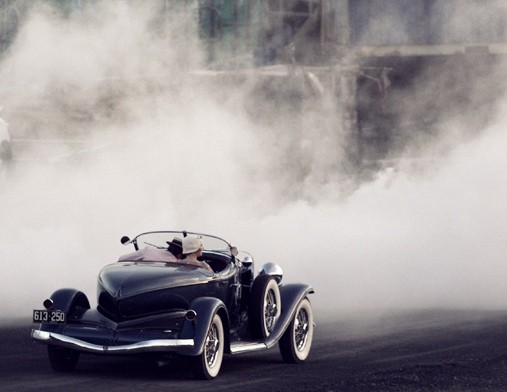The Great Gatsby Contents
Gatsby as tragic hero
Conventional hero?
 Gatsby does not fit the conventional mould of the tragic hero, since he is neither noble in the sense of being of aristocratic origin, nor morally pure (as he is a criminal, an adulterer and a liar). However, it could be argued that he occupies the same exalted ‘great’ position as a tragic hero, rising to a zenith of success and then falling to ruin at the end of the text.
Gatsby does not fit the conventional mould of the tragic hero, since he is neither noble in the sense of being of aristocratic origin, nor morally pure (as he is a criminal, an adulterer and a liar). However, it could be argued that he occupies the same exalted ‘great’ position as a tragic hero, rising to a zenith of success and then falling to ruin at the end of the text.
Nick idealises him, insisting that Gatsby ‘turned out all right at the end’ and blaming the ‘foul dust’ and the ‘careless people’ for the destruction in the novel. He mourns powerfully for Gatsby, and retreats to the West because this location is associated with older values. This is, of course, ironic, given that Gatsby left the West and his origins behind, preferring the opportunities for material success in the East. Nevertheless, Gatsby is presented as having suffered because of the corruption in his world, and it is possible to claim that he even has a ‘fatal flaw’, his weakness being his fixation on Daisy and his belief that it is possible for him to repeat the past.
However, there is a problem with labelling Gatsby a ‘hero’ of any kind, in that he barely exists as a character. Fitzgerald depicted him as an enigma, offering very few physical features apart from a radiant smile, a handful of symbolic items such as his car and his pink suit, a verbal catchphrase (‘old sport’) and an extremely flimsy curriculum vitae. Whilst Gatsby’s motivation is clear, he has no detailed psychology because his inner life is mostly imagined or mediated by Nick. There are critics who view Nick as the real ‘hero’ of the novel, since he is at the core of all its concerns and deeply conflicted between admiration and revulsion for the world of the novel and Gatsby’s idealism.
A parody of tragedy
The notion of the tragic is found elsewhere within the text, but it is more in the sense of parody than serious art:
- Wolfsheim’s nose is described as ‘tragic’ when he is being ‘sentimental’
- Myrtle’s death is briefly seen as a ‘tragic achievement’
- Gatsby himself verges on the comic as he glares ‘tragically’ into Nick’s eyes just before he meets Daisy.
These instances would imply that the novel cannot really fit into the genre of tragedy. Its world is too superficial and empty, with too little sense of anything being truly serious or meaningful. In that sense, Gatsby and his world is too flimsy a receptacle for the weight of real tragic heroism.
